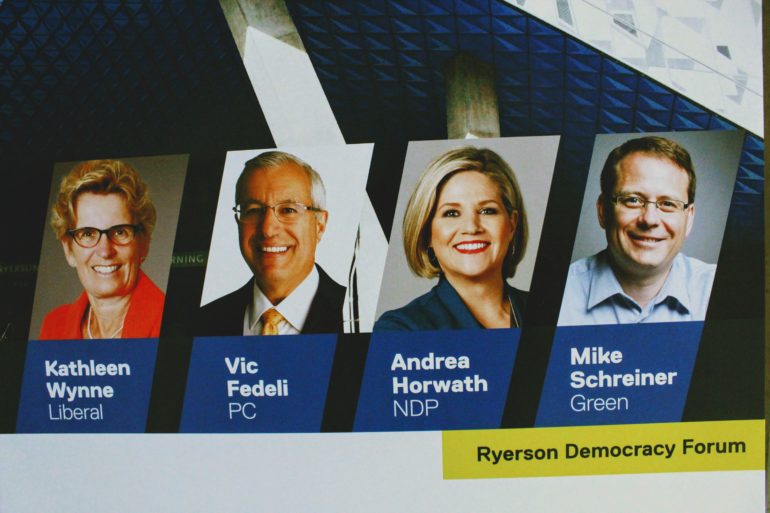
The Ontario party leaders, from left, are Green Party Leader Mike Schreiner, NDP LeaderAndrea Horwath, Premier and Liberal Leader Kathleen Wynne, and Interim Progressive Conservative Leader Vic Fedeli, along with moderator Martin Regg Cohn of The Toronto Star. (Taz Dhaliwal)
Taz Dhaliwal
Political engagement by youth is so poor that provincial party leaders think lowering the voting age to 16 is a good idea.
But the four provincial leaders who gathered at a Feb. 28 leaders’ debate at Ryerson University also say there needs to be more political outreach in marginalized communities throughout the province.
Liberal Premier Kathleen Wynne suggested registering students to vote when they are in high school in order to engage younger citizens at an earlier age but Green Leader Mike Schreiner went farther by saying they should be able to cast a ballot.
The well-mannered gathering of political opponents that also included NDP Leader Andrea Horwath and interim PC Leader Vic Fedeli agreed lowering the voting age might increase political involvement by young people.
“If you think about it that’s when your grade 10 Civics class is taking place,” Schreiner said.
The Ontario NDP leader also agreed with mobilizing youth and ensuring them that their voice does indeed matter. Ontario goes to the polls to vote on June 7.
“In our party, you can vote at 14 years of age in the NDP,” Horwath said. “You can vote on policy issues, you can vote for leaders, you can do all of that and we do that on purpose.
“We try to have an active youth group to not only talk about issues when they become old enough to be leaders, but to say to them you’re leaders now,” she said.
“We want your input, advice, your insights now as a young person,” Horwath said. “Not just at some point in the future.”
If the audience was expecting a display of fiery and heated political debate, they would have been disappointed.
Panel moderator and Toronto Star political columnist Martin Regg Cohn describes the pre-election discussion as “unprecedented” in part due to its unusually peaceful, well-mannered nature.
The politicians sat side by side each other on the stage, and were surprisingly in agreement on a number of issues.
The forum was specifically targeted towards discussing ways to boost youth voter turnout and improve political engagement in racialized communities. Cohn said youth and minority groups are likely to be under-represented yet again during the upcoming Ontario election.
Voter disengagement is especially high among youth, new Canadians, minority groups, and generally across the board, said Cohn.
He asked the Ontario party leaders whether low political engagement is a problem for democracy. “Who’s fault is it and what can we do?” asked Cohn.
Solutions discussed by the panel included lowering the voting age, implementing online voting practices, and proactively involving racialized Canadians within voting processes.
Marginalized Communities
Cohn said new Canadians are not turning out to vote in the same numbers as other groups, suggesting they don’t have enough information about the process and the parties.
He noted the Ontario PCs under Fedeli’s predecessor Patrick Brown made enormous strides reaching out to new Canadians.
“You see us out there trying to build trust,” Fedeli said.
However, Cohn said Horwath has previously told him that outreach by the party to marginalized communities is an issue she had personally struggled with.
“Because in all fairness the NDP was pretty white,” Cohn said. “How have you made out?”
Horwath said the party has to be inviting.
“When we’re talking about new Canadians, we’re talking about people from racialized communities,” she said. “You have to invite them and make sure they feel welcome, that you actually make room for them.”
Horwath said that this is one of the missions she personally took on when she became NDP leader in 2009.
“There’s a reason why we have the first ever Sikh person, who is leader of a major political party nationally and that’s because Jagmeet Singh did the work that he did with us as a caucus,” she said.
Singh was her deputy party leader and MPP for Bramalea-Gore-Malton until he became the party’s national leader last year.
“I took him under my wing and I helped him with…what you do as a leader,” Horwath said. “That’s an amazing piece I was able to be a part of.
“Jagmeet is able to reflect the communities that we have and so I think that’s the other big thing,” she said. “The people sitting around those big tables should reflect the community.”
Online voting
Fedeli suggested the province should consider adopting online voting to modernize the system and as a way to reach to people living in the digital age.
“In one word, modernize,” he said responding to questions about changes that need to be made.
“The way you work is not reflected in the government structure [of voting],” Fedeli said. He said people now mainly work using technology and mobile devices.”
Fedeli said the current system of voting is outdated and has not kept up with the modern world. He said voting today still consists of casting a vote with paper and pen inside a paperboard box.
“For example online petitions, you will go online and think you’re doing the right thing,” Fedeli said. “We in the legislature, we can’t accept them, our system is [that] you must have paper and live ink on a petition or it cannot be accepted.
“How is that inviting?” he asked.
The other leaders were apprehensive to some of Fedeli’s suggestions due to security concerns surrounding online voting.
Wynne said voting is a both a personal and communal act while Horwath lamented how the end of door-to-door enumerators weakened the voting process by cutting engagement.

Poster for the discussion on democratic engagement event at Ryerson University. (Taz Dhaliwal)

